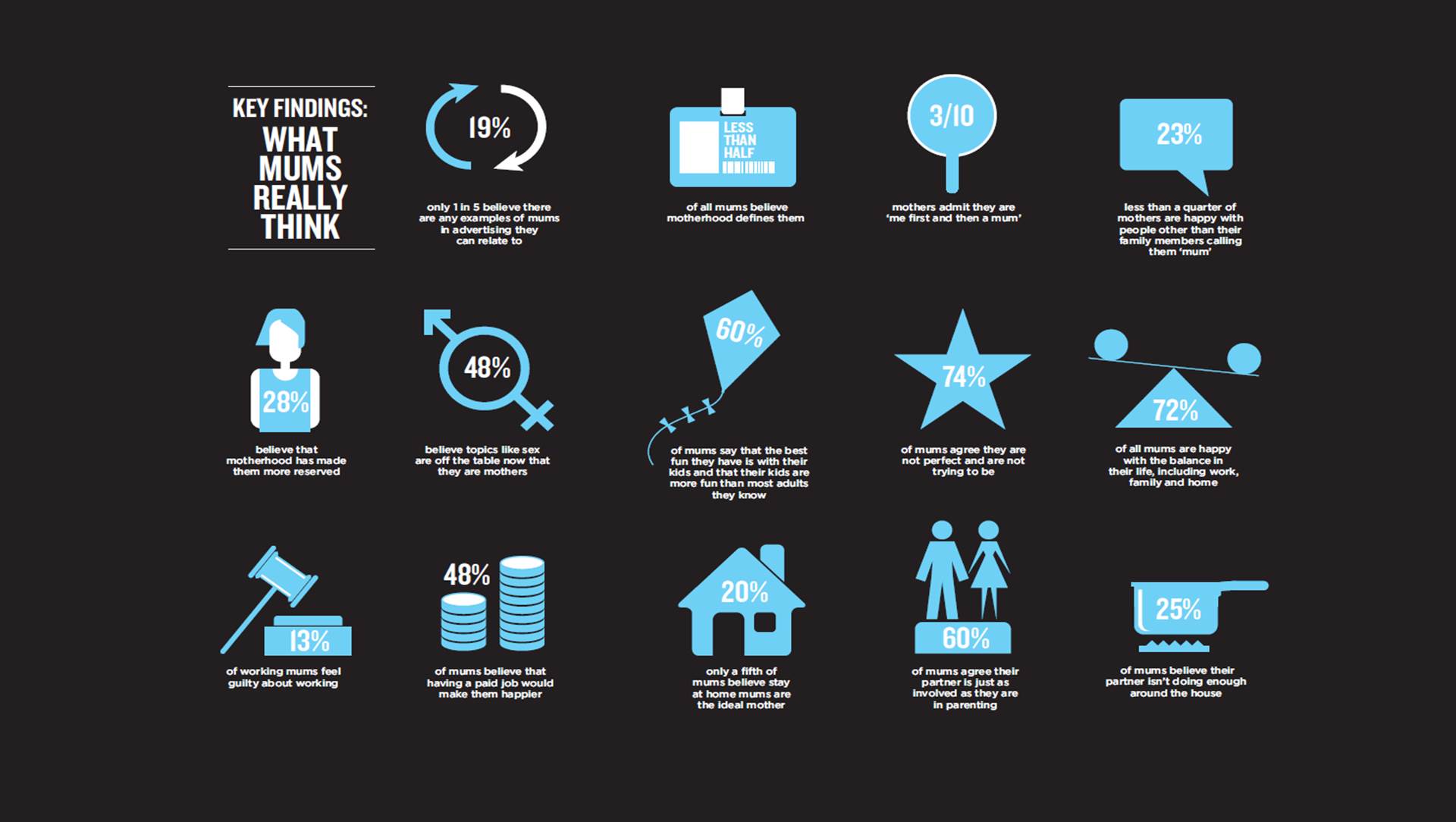With nearly 18 million mums in the UK alone, brands standing on a ‘mother knows best’ platform will not be viewed as perpetrating a cliché, they could be seen as out of touch with nearly every mum they are trying to reach.
Saatchi & Saatchi together with Saatchi & Saatchi X, recently partnered with the parenting portal, Mumsnet to commission a piece of research into motherhood. After speaking to nearly 900 mums and the 8,000 members of Mumsnet parent’s panel, they discovered that there is a discernible discord between how marketing departments see mums, and how mums see themselves.
For example, less than half of all mums believe that motherhood defines them. Most adverts would have us believe that it does. 74% of mums agree that they are not perfect and are not trying to be, while 60% of mums agree their partner is just as involved in parenting as they are. So where are these representations of mothers?
The majority of advertisements would have us believe that mothers are invincible, and fathers are invisible. Women with children are type-cast into being a perfect specimen of motherhood. A dangerous idealised image, that removes identity and reduces the impact the advert makes on the audience.

But no matter how noble the efforts to cast mum in a more modern role in advertising are, the familiar stereotypes seem to subtly emerge, leaving the likelihood of mum’s seal of approval more to chance than perhaps is understood.
Public Health England, in its latest initiative, sought out mums in order to sort out national nutrition. The Change4Life Smart Swaps campaign spoke specifically to mums; the supposed voice on family food. With adverts running across TV, radio and online, it attempted to encourage mums to make healthy food switches for the wellbeing of the family, and aimed to show that lessening the sugar could heighten the health.
A product normally thought of with addressing the other end of the market, Sudocrem, created an advert to drive purchase beyond the early year’s use it is so famous for. It features two boys, bragging over the scrapes they’ve suffered and the stories of how they received them. When mum comes in at the end, there is the reassurance that Sudocrem is the perfect remedy, purposely aimed at her, for soothing ‘all of life’s little dramas.’

While these campaigns are arguably well-executed, they undoubtedly carry with them some heavy assumptions: assumptions that are founded, not in the marketing companies themselves, but in society in general. Mums are the ones who care for the day-to-day needs of the children. They write the shopping lists, and they make the meals. They soothe injuries, and subdue cries. These concepts of motherhood may seem stereotypical, but they are still representative of the views of the majority. Arguably, advertising has no choice but to remain generalised in its portrayal of motherhood. If it becomes too specific it risks marginalising the impact of an intended national campaign.

Another approach when marketing to mums is to move away from the mode of motherhood, and towards the familiarity of family. Anchor, in a bid to promote their cheese, designed a new TV campaign which focused on ‘The Glorious Nothing Days.’ Continuing on with Anchor’s ‘Tastes Like Home’ positioning, the advert showed a real-life family spending a lazy day together, with no plans and no place to go. It shows the imperfections of life with children; fun, challenging and often, chaotic. However, once again, mums cannot seem to escape being tied to their title.
Marketing to mums is certainly not simple. It is understandable why brands use a generalised representation of motherhood in their adverts, and why this representation is based on society’s abstract ideal of what a mum should be. The products are often designed for children, and the figure of motherhood is currently interchangeable with the image of family. But with only 1 in 5 women with children believing there are examples of mums in advertising they can relate to, there is certainly the need for change. Perhaps, as family roles continue to evolve, companies will start keeping mum about motherhood, and begin identifying the individual instead. The target market of ‘mums’ does women with children a disservice. Marketing to mums needs to begin recognising the diversity and complexity of such a category, and most importantly, to realise that ‘mum’ is most definitely not the most important word.
Observations inspired by insight articles posted on haystackonline.com. Read more from haystackonline in our Clubhouse.
